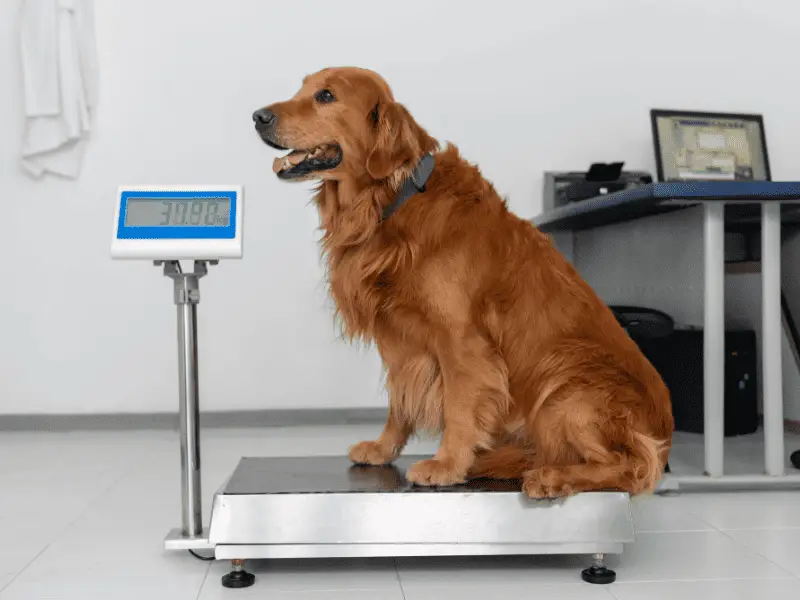A Dog Weight Size Chart is essential to keep track of our dog’s weight. In this section, we will explore the rising incidence of obesity in dogs and the impact it has on their health. We’ll also discuss the importance of maintaining a healthy weight to prevent various diseases.

So, let’s dive into the facts and figures that highlight the significance of maintaining a healthy dog weight for their overall well-being.
Rising Incidence of Obesity in Dogs and Its Impact on Health
Obesity in dogs is becoming more common. It has big implications for their health. People need to be aware of this growing problem and its bad effects.
The American Kennel Club breed weight standards provide info about the ideal weight for each breed. Pet owners can see if their dog is at a healthy weight or not. They should use body and muscle condition scores too.
Managing a dog’s weight is important. Exercise and the right nutrition help. Balance their diet so they don’t get too many calories. Plus, probiotics support digestion and weight control. The Dog Size-O-Meter is useful for tracking progress. But, it’s only a guide.
It’s smart to get professional help from vets. Regular visits help track progress and spot issues. Some places offer free consultations on weight management.
In conclusion, obesity in dogs is a concern. People need to manage their dog’s weight. This means proper nutrition, exercise, and vet visits.
Need to Maintain a Healthy Weight to Prevent Various Diseases
Maintaining a healthy weight in dogs is essential for avoiding various diseases. The increasing rate of dog obesity has had a huge effect on their health. Being overweight increases the chance of problems like diabetes, heart disease, and joint issues. Keeping dogs at a healthy weight can reduce the risks of these illnesses and give them a longer, better life.
It’s important to understand the importance of dog size and body condition. The American Kennel Club breed weight standards provide guidelines for the right weight range for each breed. Checking the body condition score tells you if a dog is underweight, overweight, or at a good weight. Evaluating the muscle condition score gives info about the muscle mass and fitness level of dogs.
In addition to breed standards and body condition scores, providing correct nutrition and exercise is necessary for keeping a healthy weight in dogs. Giving meals with proper portion sizes prevents too many calories. Doing physical activity boosts weight management and also helps cardiovascular health, bone strength, and mental stimulation for dogs.
Something not many know about is how weight management in dogs relates to gut health. A healthy gut microbiome affects metabolism and digestion. Keeping gut health through a proper diet and supplements can help weight management by helping with nutrient absorption and digestion.
Size charts can be useful for tracking a dog‘s weight, but they may not take into account individual differences such as muscle mass or bone density. Talking to a vet who can assess health factors and give nutritional advice is important for weight management success.
Pet owners should go to the vet often to monitor weight management goals. Some vet practices and pet shops offer free consultations to help with dog weight management. Getting professional help ensures pet owners get personalized advice and plans for maintaining their pup’s healthy weight.
Getting your pup in shape isn’t just about being cute—it’s about keeping them healthy and saving money on vet bills.
The Significance of Dog Weight and Body Condition
Maintaining a healthy weight for our furry companions is crucial, and in this section, we’ll explore the significance of dog weight and body condition. Discover the insights from the American Kennel Club Breed Weight Standards, gain an understanding of the Body Condition Score, and learn about the importance of the Muscle Condition Score. You’ll see how these factors play a vital role in ensuring the well-being of your beloved pets.
Understanding the American Kennel Club Breed Weight Standards
The American Kennel Club has Breed Weight Standards. The table below summarizes them:
| Breed | Weight Range (lbs) |
|---|---|
| Labrador | 55-80 |
| Bulldog | 40-50 |
| Golden Retriever | 55-75 |
| German Shepherd | 75-95 |
Breed characteristics, body structure, and health are taken into account. However, individual dogs can differ in activity level and genetics.
It’s important to understand the AKC Breed Weight Standards. But body condition score and muscle condition scores are also essential. These provide a complete look at the dog’s physical fitness.
The Body Condition Score
The Body Condition Score (BCS) is important and understanding the American Kennel Club Breed Weight Standards is helpful. These provide guidelines on ideal weight for each breed. Pet owners can compare their dog’s actual weight to these standards and determine if they need adjustments.
BCS includes evaluating muscle condition – well-defined muscles without fat covering them. Monitoring this helps prevent obesity or malnutrition. It can vary due to age, breed, etc., so consulting a vet is recommended.
To maintain an ideal BCS for your dog, exercise and nutrition are important. Exercise helps burn calories and quality meals in right portions provide essential nutrients.
Gut health is also vital for weight management. This helps efficient digestion and absorption of nutrients, reducing bloating and constipation. Probiotics or prebiotics in diet promote gut health and support weight goals.
By prioritizing the BCS and following these suggestions, pet owners can help their dogs stay healthy. Regular vet visits are important for tracking progress and making necessary adjustments.
The Muscle Condition Score
To better understand the Muscle Condition Score, creating a table can help. This table will have columns such as “Muscle Tone,” “Muscle Mass,” and “Overall Body Composition.” Under each column, put categories like “Excellent,” “Good,” “Fair,” and “Poor” to assess the muscle condition.
Veterinarians and pet owners can use this table to objectively evaluate a dog’s muscle condition. It is also useful for monitoring a dog’s fitness and can help identify areas needing attention or improvement.
It is important to consider other factors too, like body weight, body fat percentage, and overall body composition. This will help vets provide tailored nutrition and exercise plans to help dogs reach and keep an ideal Muscle Condition Score.
Weight Management Strategies for Dogs

Maintaining a healthy weight for our canine companions is crucial, and in this section, we’ll explore effective weight management strategies for dogs. Discover the importance of exercise and nutrition in maintaining a healthy weight. Additionally, we’ll uncover the role of gut health in weight management, providing valuable insights for pet owners seeking the best practices to keep their dogs in optimal shape.
Exercise and Nutrition for Maintaining a Healthy Weight
Exercise and nutrition are key for dogs’ healthy weight maintenance. Obesity in canines is on the rise, showing just how important regular exercise and diet balance is. Activities such as walking, running, and fetching help burn calories and keep muscles strong, while a nutritious diet gives necessary nutrients for overall wellness.
- Regular exercise: Dogs need daily activity like walking, running, or playing fetch to stay fit. This helps them lose calories and keep muscles toned, while also improving their cardiovascular health.
- Controlled portion sizes: What and how much food a dog gets depends on their size, breed, and activity level. Too much food leads to excess weight gain, while too little may lead to malnourishment.
- A balanced diet: Protein, carbs, fats, vitamins, and minerals are all vital for a balanced diet. A vet can help decide what type and how much food works best for each pup.
- Healthy treats: Treats can be part of a dog’s diet, as long as it’s accounted for in their total calorie intake. Opt for low-calorie snacks or use fruits and veggies instead.
- Hydration: Clean drinking water is crucial for proper hydration levels, which helps dogs with digestion, nutrient absorption, and overall health.
Exercise and nutrition go hand-in-hand for dogs’ weight management. Doing regular activities and feeding the right diet for individual needs prevents too much or too little weight.
Sarah, a devoted pup mom, walked her Labrador retriever daily and fed him lean proteins. Thanks to her commitment to exercise and nutrition, her Labrador stayed in ideal body condition throughout his life and was full of energy. Sarah’s story proves the vital role of exercise and nutrition for dogs’ healthy weight.
Gut Health and Weight Management
The digestive system has a vital role in keeping dogs fit and healthy. A well-functioning gut helps the body digest and absorb nutrients, which is essential for weight control. It also helps avoid tummy troubles that can cause weight gain or stop weight loss.
Good nutrition is key to supporting gut health and weight control in dogs. Giving them a balanced diet with quality ingredients gives dogs the right nutrients without too many calories. Adding prebiotics and probiotics to their diet can help the gut microbiome, which helps digestion and nutrient absorption.
Exercise is also important for weight control in dogs. Doing physical activity regularly not only burns calories but also keeps muscle mass and stops obesity-related health issues. Exercise also stimulates the digestive system and helps pass stools, which can help gut health even more.
It’s best to get professional help when managing your dog’s weight and gut health. Vets can give advice on diets, exercise plans, and supplements that can help your dog’s health. They can also check your dog’s body condition score over time and change the advice if needed.
By looking after the gut along with the right nutrition and exercise, you’ll help your dog stay at a healthy weight and reduce the risk of illnesses linked to obesity. Investing in your pet’s health now will give them a longer and healthier life.
Make sure you do all you can to help your dog’s gut health by giving them a balanced diet, regular exercise, and getting professional help if needed. Taking these steps will stop any weight issues and help your pet’s overall well-being. Don’t miss out on the chance to make your dog’s life longer and better by supporting their gut health as part of their weight management.
Using a Dog Size Chart for Weight Monitoring
When it comes to keeping our furry friends healthy, using a dog size chart for weight monitoring can be a helpful tool. In this section, we will introduce the Dog Size-O-Meter, a useful resource for dog owners to track their pet‘s weight. Additionally, we will explore the limitations of weight charts, ensuring a comprehensive understanding of how to best use this tool for monitoring our dog’s health.
Introducing the Dog Size-O-Meter
The Dog Size-O-Meter is a great tool for pet owners! It helps monitor and track the weight of their dogs. The easy-to-use reference chart compares the dog‘s weight to the average for its breed.
Benefits include:
- Determining if a dog is underweight, overweight, or a healthy weight.
- Guiding feeding decisions and portion control.
- Setting realistic weight management goals.
- Assessing the dog’s body condition score during vet visits.
- Preventing obesity-related health issues.
Plus, it’s convenient and simple to use! No complicated calculations! It visually shows the ideal weight for specific breeds, so pet owners can take an active role in their dog’s health. Studies show that maintaining a healthy weight is linked to better quality of life for dogs.
Understanding the Limitations of Weight Charts
Weight charts for dogs have restrictions. This means pet owners must be aware of them. They provide guidance, but it is important to understand their limits and use them as a beginning point for weight tracking.

- Weight changes: Weight charts may not consider natural differences in a dog’s weight because of age, breed, and metabolism. A healthy dog can be above or below the recommended weight range with no health issues.
- Body structure: Weight charts don’t look at the dog’s body composition, especially muscle and fat. 2 dogs with the same weight can have different levels of fitness and health, based on their muscle mass and body condition score.
- Breed variations: Dog breeds vary in size, structure, and metabolism. Weight charts may not be exact for certain breeds or mixed-breed dogs that don’t fit standard breed categories.
- Individual needs: Every dog is unique with different nutrition and exercise needs to keep a healthy weight. Weight charts don’t account for these individual differences or illnesses that may affect weight.
To overcome these limits, pet owners should consult their veterinarian for a personalised weight plan. This includes regular body and muscle condition scores to evaluate health, not just weight.
In addition, regular exercise tailored to the dog’s age, breed, and physical abilities helps maintain an optimal body condition. Nutrition is also important, giving the dog a balanced diet that meets its needs and avoiding extra calories.
By understanding the restrictions of weight charts and seeking vet advice, pet owners can better manage their dog’s weight. This helps them live longer and have a good quality of life. Seeking expert help is essential for weight management, because sometimes you need a professional to help with your pup’s pounds.
Seeking Professional Guidance and Support
When it comes to maintaining a healthy weight for your beloved canine companion, seeking professional guidance and support is crucial. In this section, we will explore the various avenues available to pet owners, including routine veterinarian visits for tracking weight management goals. Additionally, we’ll discuss the availability of free dog weight management consultations in select vet practices and pet shops. Stay informed to ensure your furry friend’s well-being and overall health.
Routine Veterinarian Visits for Tracking Weight Management Goals
Routine vet visits are essential for managing weight. They give pet owners a chance to talk with professionals who can weigh the dog, monitor progress, and provide advice on staying healthy. Vets assess the dog’s body condition and discuss weight goals.
Vets play a key role in tracking weight by monitoring the dog’s weight at regular visits. They examine if the dog is a healthy weight or needs changes to their diet or exercise. They also suggest tailored nutrition and exercise. Other tests like body condition scoring and muscle condition scoring can be used to assess fat and muscle tone.
Routine vet visits to track weight are beneficial for early detection of issues. These experts know what to look for when it comes to obesity and other related health issues. They can help owners adjust diet or exercise before serious problems occur. Studies have shown that vet care leads to earlier detection and treatment for various diseases.
By prioritizing routine vet visits, pet owners can take steps to protect their dog’s health and increase their life quality. To save pets from ‘fat’-astrophe, some vet practices and pet shops offer free weight management consultations.
Free Dog Weight Management Consultations in Some Vet Practices and Pet Shops
Vet practices and pet shops can provide free consultations for pet owners concerning dog weight management. This guidance can help owners understand how to care for their pup’s weight. Professionals in these settings can give advice on nutrition, exercise, and other strategies for managing the dog’s weight.
The consultations are personalized for each pup. Professionals assess the pup’s breed, age, and health. This helps them create a suitable plan for managing the pup’s weight.
Also, the consultations give pet owners a chance to ask questions and talk about their concerns. Professionals can offer tips on portion control, exercise, and how to track progress.
Not all vet practices and pet shops offer these free consultations. But, if they do, it is a great resource for managing a pup’s healthy weight.
A study published in Veterinary Record found that regular vet check-ups are significant for successful long-term weight management in dogs.
Conclusion: Prioritizing Your Dog’s Healthy Weight for Longevity and Quality of Life
Maintaining a healthy weight for your furry companion is crucial for their longevity and quality of life. In this conclusion, we’ll highlight the importance of prioritizing your dog’s weight and share key takeaways from the article. Let’s encourage responsible weight management for our beloved pets and emphasize the need for professional guidance in this vital aspect of their well-being.
Importance of Maintaining a Healthy Weight for Dogs
Preventing diseases linked to obesity is vital for dogs. This can be done through proper diet, exercise, and regular vet visits. To understand what a healthy weight is for specific breeds, pet owners should look up breed standards from the American Kennel Club. Body condition and muscle condition scores also help to assess the dog’s overall health and fitness. Gut health is also important in weight management, and proper nutrition can help maintain a healthy weight.

Tools such as the Dog Size-O-Meter may be useful, but it is best to consult with professionals for accurate guidance. Free weight management consultations are sometimes available from vet practices and pet shops. Regular vet visits are essential to track progress.
In conclusion, prioritizing a dog’s healthy weight is essential for their wellbeing. Pet owners should look for professional advice and support to ensure the best weight management practices for their furry friends. Remember, your dog’s weight has an effect on more than just their tail!
Key Takeaways from the Article
Let’s unpack the key takeaways from this article:
- Monitoring a dog’s weight is made easier by understanding breed standards set by the American Kennel Club.
- Body condition & muscle condition scores can assess if a dog is at a healthy weight.
- Exercise and nutrition are key for maintaining a dog’s weight. Gut health matters too.
Note: A dog size chart can provide general guidelines, but individual factors should be considered. For support, routine vet visits and free consultations are recommended.
Encouragement to Prioritize Dog’s Weight Management and Seek Professional Guidance
The increase in obesity amongst dogs demands action on weight management. It is essential to understand the American Kennel Club breed weight standards and use tools like body condition score and muscle condition score. To keep dogs healthy, proper exercise and nutrition strategies should be implemented. Gut health should also be monitored to ensure effective weight management.
Therefore, getting professional guidance is important. It involves more than just tracking a dog’s weight. Veterinarians can help create personalized diet plans and exercise routines which are tailored to each dog’s needs.
A concerning fact is that overweight or obese dogs are more likely to suffer from joint problems, heart disease, diabetes, and shorter life expectancy.
Some Facts About Healthy Dog Weight: A Size Chart for Pet Owners:
- Obesity in dogs is on the rise and can lead to various health conditions.
- The American Kennel Club provides breed weight standards as a guide, but veterinarians can determine the most accurate healthy weight range for individual dogs.
- Overweight dogs may show signs of exercise intolerance and difficulty in rising or jumping.
- Muscle loss can be assessed using the Muscle Condition Score and can be associated with certain diseases.
- Routine veterinarian visits are necessary to track weight management goals and address any underlying conditions.



